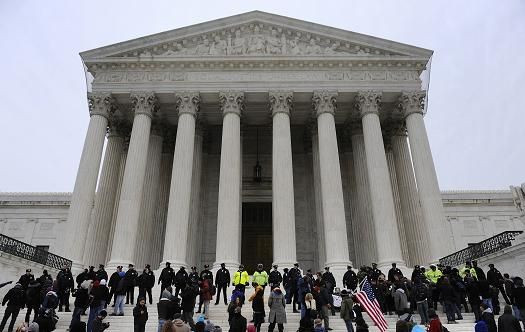Same-Sex Marriage Coming Soon To US Supreme Court

Fresh off of a series of unprecedented victories on election night, gay rights advocates are awaiting the U.S. Supreme Court's imminent decision on hearing a same-sex marriage case.
The high court is widely expected to take on a case considering the constitutional merits of same-sex marriage this term. The justices were originally scheduled to meet and discuss choosing from one of several potential cases on Nov. 20; that has since been pushed back to Nov. 30.
Voters ended an unbroken string of defeats at the ballot box on Nov. 6, affirming the rights of same-sex couples to marry in Maine, Washington and Maryland and rejecting an amendment to Minnesota's state constitution that would have restricted marriage to a union between a man and a woman.
Advocates are now hoping to ride that momentum to push for expanded same-sex marriage rights in a handful of states.
“Now that they’re on the defensive on all fronts and we’re on the offensive on all fronts, we’ve got to take this momentum and turn it into our next victories,” Human Rights Campaign President Chad Griffin told Politico. “At times like this, you can’t slow down. You’ve got to double down.”
But more state-level successes would still be tempered by the continuing federal ban on same-sex marriage. The Defense of Marriage Act, a federal law mandating that the only valid marriages are between a man and a woman, prevents the federal government from recognizing same-sex marriages and from offering married same-sex couples a wide range of benefits.
A few of the cases the Supreme Court could take up directly challenge that embargo on federal benefits. In one, Windsor v. United States, the plaintiff sued after being denied a federal estate tax deduction after her wife died. The Second Circuit Court in Manhattan sided in October with the plaintiff, with the majority opinion arguing that the Defense of Marriage Act is "not substantially related to an important government interest."
Two other cases concern health care benefits for the spouses of federal employees. Plaintiffs in those cases have sued the Office of Personnel Management, and lower courts have backed their arguments that being barred from receiving those benefits violates equal protection guarantees.
The Supreme Court could also weigh in on the legal battle over Proposition 8, a California ballot initiative that nullified the state’s earlier decision to legalize same-sex marriage. The Ninth Circuit court of appeals has struck down Proposition 8, and supporters of the measure have appealed to the Supreme Court.
President Barack Obama has signaled his opposition to the Defense of Marriage Act by ordering the Department of Justice to stop defending the law in court. Obama later articulated his personal investment in the issue, becoming the first American president to publicly declare his support for same-sex marriage.
© Copyright IBTimes 2024. All rights reserved.





















